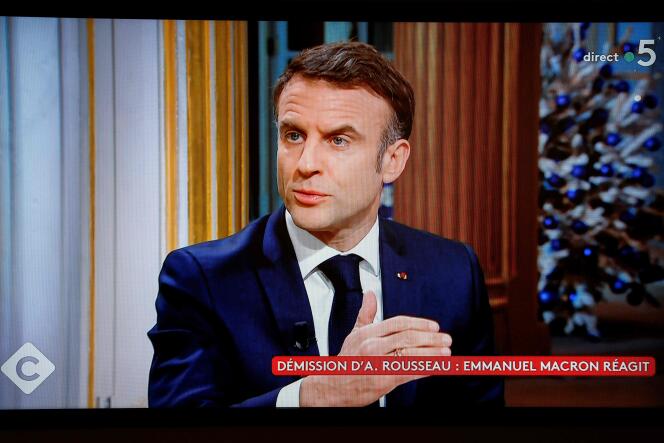


Emmanuel Macron sees nothing "dishonorable" in his course of action. Accused by the left and part of his own camp of having sacrificed republican values to get his controversial immigration law voted by Parliament, the French president, interviewed on French television on Wednesday, December 20, pushed back the charges that had been leveled against him over the last 24 hours.
Slamming his fist on the table, Macron took ownership of the law, which he called "courageous." Even if the text, shaped by the right-wing Les Républicains (LR), themselves seduced by the arguments of the far-right Rassemblement National (RN), has fractured his majority and upset some ministers. Left-leaning members of Macron's coalition worry about the introduction of restrictions to jus soli, the right to obtain French citizenship from being born in France, the introduction of "national preference" for the payment of family allowances and the extension of the possibility to strip dual nationals of their French citizenship. "Is this an ontological break? The answer is no," said Macron, insisting the law was designed to both "combat illegal immigration" and "better integrate workers." Critics, including in his own camp, say the concessions made to the right mean the text is no longer balanced.
Macron described it as the "shield that we needed," even if he rejected the fantasy of a flood of migrants. He repeated that the text "will enable us to fight against what sustains the Rassemblement National." "If we don't want the RN to come to power, we have to deal with the problem that is feeding it," he said defiantly, pushing back on Marine Le Pen's "ideological victory" claim. Of course, certain "symbolic" measures, designed to soften up the LR, an ally of circumstance, may have "offended some people's consciences," but they are in no way copied from the RN's agenda, he maintained: "What has the Rassemblement National been demanding for years? Make the children of foreigners pay for school. Are we doing that in this text? No," he defended, noting that reserving jobs for French people rather than foreigners is out of the question. It's true that jus soli, the right to obtain French citizenship from being born in France, will no longer be automatic, but "is that shocking?" Macron asked, stating that "integration is a pact."
"The debate has ignited," admitted Macron, noting the turmoil within his own ranks. Some 60 deputies from the president's governing coalition voted against the text or abstained the day before at the Assemblée Nationale. MP Jean-Charles Larsonneur went further, announcing his resignation from his group on Wednesday: "The dam has been breached, I'm saying stop."
You have 60% of this article left to read. The rest is for subscribers only.
